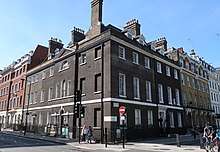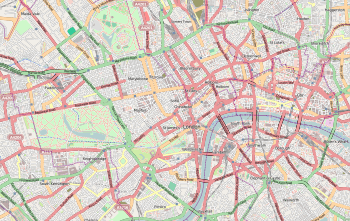Pushkin House, London
Pushkin House (Russian: Пушкинский Дом) is the UK's oldest independent Russian cultural centre. Founded in 1954 in a house in Notting Hill by a group of émigré Russian friends, led by Maria Mikhailovna Kullmann (Zernova). Their aim was to create a welcoming meeting-place "for the enjoyment, understanding and promotion of Russian culture in all its forms, and for the exchange of views in a lively, informal atmosphere, with freedom of speech a core principle".[1]
Listed Building – Grade I | |
|---|---|
| Official name | NUMBERS 5, 5A AND 6 AND ATTACHED RAILINGS AND LAMP HOLDER |
| Designated | 24 October 1951 |
| Reference no. | 1244506 |
 UK's oldest independent Russian cultural centre | |
 Location within Central London | |
| Established | 2006 |
| Location | 5a Bloomsbury Square, London, WC1 |
| Director | Clementine Cecil |
| Public transit access | Holborn Tottenham Court Road |
| Website | http://www.pushkinhouse.org |
Today, Pushkin House remains true to its original mission. In its current home, a 300-year-old listed building on Bloomsbury Square, Pushkin House hosts a varied programme of Russian literature, poetry, art, cinema, music, theatre and dance, history, philosophy and current affairs. Events include lectures, exhibitions, films, concerts, readings, panel discussions, debates and its celebrated annual Book Prize.
Pushkin House is a politically independent, Registered UK Charity, owned and run by the Pushkin House Trust. While the original endowment set up more than half a century ago ensures its independence, Pushkin House relies on ticket sales and unconditional donations from the public to maintain quality programming.
History
Pushkin House has existed in London since 1954 and has borne witness to dramatic changes in the relationship between Britain and Russia. It was in 1953 that Maria Kullmann recognised a need in London for a politically neutral centre of Russian culture. With a small group of family and friends she bought 24 Kensington Park Gardens as a house for students and academics of all nationalities. The first meeting of the Pushkin Club was held there in 1954. By 1956 it was clear that the Pushkin Club needed a premises of its own; and it subsequently bought 46 Ladbroke Grove, which remained its home until 2005.[2]
The establishment of the original Pushkin House coincided with the immediate post-Stalin years and the Thaw, when interest in things Russian was intense. These years were marked, for example, by the first yearly visits of the Bolshoi and Kirov (now Mariinsky) Opera and Ballet companies. Several distinguished scholars, writers and artists of the post-revolutionary emigration were still alive, and the Pushkin Club provided them with an effective platform.
Speakers in the early days included Metropolitan Anthony, Sir Isaiah Berlin and Dame Elizabeth Hill. In 1955, Tamara Karsavina spoke of her life in ballet; the following year Edward Crankshaw talked of the Soviet Union in the aftermath of the 20th Party Congress. Scriabin's sister and Medtner's widow were both regular attendees. The poet Korney Chukovsky performed at the club in June 1962.[3]
Mstislav Dobuzhinsky, one of the last surviving members of Mir Iskusstva, held more than one exhibition in the Club and presented several of stage designs to the Club. There was an exhibition of paintings and lithographs by Leonid Pasternak. Soviet writers brought to the UK by the British Council would often come and talk at the Pushkin Club; they included Konstantin Fedin and Alexander Tvardovsky in 1960. It also provided a rehearsal venue for the London Balalaika Ensemble, also popular during the 1960s. The Pushkin Club enabled people from opposite ends of the political spectrum to meet and discuss; this remains a firm commitment of Pushkin House to the present day.[4]
Current activities
Pushkin House has been established to serve as a home and dedicated showcase for Russian culture in London, a focus for Anglo-Russian cultural exchange, a provider of education and information on Russian language and culture, a resource and networking centre for individuals and institutions.
In pursuit of these aims, Pushkin House has developed a lively and varied cultural programme on Russian literature, art, film, music, theatre and dance, as well as history, philosophy and politics. Events include lectures and talks, seminars, conferences, exhibitions, films, concerts and readings.
Besides its own events, Pushkin House welcomes and encourages collaboration with other institutions and groups dedicated to Russian culture. The House currently hosts lectures run by the Pushkin Club and the GB-Russia Society, amongst other collaborators. Regular Russian language courses are provided by the Russian Language Centre, located on the top floor of Pushkin House.[5] Creative partnerships are being established with major museums and libraries in Russia.
Pushkin House Book Prize
The Pushkin House Book Prize was launched in 2013 with an aim to "encourage public understanding and intelligent debate about the Russian-speaking world". The prize is for a book published in English, but translations from other languages, including of course Russian, are encouraged and actively sought.[6][7]
Winners
- 2013 – Former People: The Last Days of the Russian Aristocracy by Douglas Smith
- 2014 – Red Fortress: The Secret Heart of Russia's History by Catherine Merridale
- 2015 – The Last Empire by Serhii Plokhy
- 2016 – Towards the Flame by Dominic Lieven
- 2017 – The Russian Canvas: Painting in Imperial Russia (1757-1881) by Rosalind P. Blakesley
- 2018 – The War Within by Alexis Peri
References
- "Pushkin House". Pushkin House. Retrieved 1 June 2020.
- "About us". Pushkin House. Retrieved 1 June 2020.
- Kornei Chukovsky (1 October 2008). Diary, 1901-1969. Yale University Press. p. 468. ISBN 978-0-300-13797-2.
- P O'Neill, orchestra member at the time
- "The Russian Language Centre". Russian Centre. Retrieved 2 June 2020.
- Pushkin House Russian Book Prize
- Pushkin House Russian Book Prize - Past Prizes